Nr 507 week 2 discussion - Study guides, Class notes & Summaries
Looking for the best study guides, study notes and summaries about Nr 507 week 2 discussion? On this page you'll find 147 study documents about Nr 507 week 2 discussion.
All 147 results
Sort by

-
NR 507 WEEK 1 UPTO FINAL WEEK EXAM PLUS MIDTERM AND FINAL EXAM ALL BUNDLED TOGETHER!!!
- Package deal • 12 items • 2023
-
- $35.49
- 1x sold
- + learn more
NR 507 WEEK 1 UPTO FINAL WEEK EXAM PLUS MIDTERM AND FINAL EXAM ALL BUNDLED TOGETHER!!! Exam (elaborations) NR 507 MIDTERM EXAM / 170 QUESTIONS AND VERIFIED ANSWERS 2023/2024 / ALL CORRECT. 2 Exam (elaborations) Chamberlain College of Nursing NR 507 WEEK 3 DISCUSSION LATEST 2022/2023 3 Exam (elaborations) Chamberlain College of Nursing NR 507 WEE
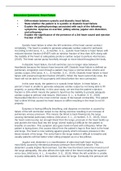
-
NR 507 Week 2 Discussion; Heart Failure
- Other • 14 pages • 2022
- Available in package deal
-
- $15.49
- 1x sold
- + learn more
• Differentiate between systolic and diastolic heart failure. • State whether the patient is in systolic or diastolic heart failure. • Explain the pathophysiology associated with each of the following symptoms: dyspnea on exertion, pitting edema, jugular vein distention, and orthopnea. • Explain the significance of the presence of a 3rd heart sound and ejection fraction of 25%.
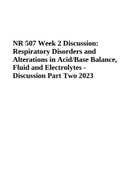
-
NR 507 Week 2 Discussion: Respiratory Disorders and Alterations in Acid/Base Balance, Fluid and Electrolytes - Discussion Part Two 2023
- Exam (elaborations) • 24 pages • 2023
-
- $18.49
- + learn more
NR 507 Week 2 Discussion: Respiratory Disorders and Alterations in Acid/Base Balance, Fluid and Electrolytes - Discussion Part Two 2023. Tammy is a 33-year-old who presents for evaluation of a cough. She reports that about 3 weeks ago she developed a “really bad cold” with rhinorrhea. The cold seemed to go away but then she developed a profound, deep, mucus-producing cough. Now, there is no rhinorrhea or rhinitis—the primary problem is the cough. She develops these coughing fits that are...
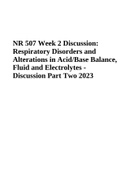
-
NR 507 Week 2 Discussion: Respiratory Disorders and Alterations in Acid/Base Balance, Fluid and Electrolytes - Discussion Part Two 2023
- Exam (elaborations) • 24 pages • 2023
- Available in package deal
-
- $17.49
- + learn more
NR 507 Advanced Pathophysiology. NR 507 Week 2 Discussion: Respiratory Disorders and Alterations in Acid/Base Balance, Fluid and Electrolytes - Discussion Part Two 2023. Analyze pathophysiologic mechanisms associated with selected disease states. (PO 1) 2 Differentiate the epidemiology, etiology, developmental considerations, pathogenesis, and clinical and laboratory manifestations of specific disease processes. (PO 1) 3 Examine the way in which homeostatic, adaptive, and compensatory phy...
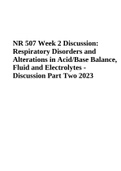
-
NR 507 Week 2 Discussion: Respiratory Disorders and Alterations in Acid/Base Balance, Fluid and Electrolytes - Discussion Part Two 2023
- Exam (elaborations) • 24 pages • 2023
-
Available in package deal
-
- $16.49
- + learn more
NR 507 Week 2 Discussion: Respiratory Disorders and Alterations in Acid/Base Balance, Fluid and Electrolytes - Discussion Part Two 2023. Dr. Brown and Class, Respiratory diseases can have very non-specific symptoms, which can make forming a diagnosis difficult. The general symptoms of a respiratory tract infection include: cough (with or without sputum production), hemoptysis, weight loss, breathlessness, night sweats, fever, general lethargy, and malaise (Kaufman, 2011). It appears Tammy was...
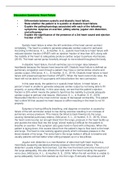
-
NR 507 Week 2 Discussion Heart Failure
- Other • 14 pages • 2023
- Available in package deal
-
- $15.99
- + learn more
Discussion Questions: Heart Failure • Differentiate between systolic and diastolic heart failure. • State whether the patient is in systolic or diastolic heart failure. • Explain the pathophysiology associated with each of the following symptoms: dyspnea on exertion, pitting edema, jugular vein distention, and orthopnea. • Explain the significance of the presence of a 3rd heart sound and ejection fraction of 25%.
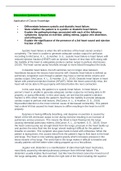
-
NR 507 Week 2 Discussion; Heart Failure
- Other • 14 pages • 2022
- Available in package deal
-
- $15.49
- + learn more
Case Scenario: A 72-year-old male presents to the primary care office with shortness of breath, leg swelling, and fatigue. He reports that he stopped engaging in his daily walk with friends three weeks ago because of shortness of breath that became worse with activity. He decided to come to the office today because he is now propping up on at least 3 pillows at night to sleep. He tells the NP that he sometimes sleeps better in his recliner chair. PMH includes hypertension, hyperlipidemia and T...
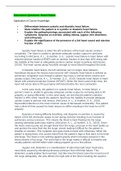
-
NR 507 Week 2 Discussion; Heart Failure
- Other • 14 pages • 2022
-
- $18.49
- + learn more
• Differentiate between systolic and diastolic heart failure. • State whether the patient is in systolic or diastolic heart failure. • Explain the pathophysiology associated with each of the following symptoms: dyspnea on exertion, pitting edema, jugular vein distention, and orthopnea. • Explain the significance of the presence of a 3rd heart sound and ejection fraction of 25%.
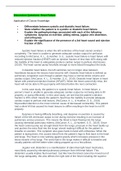
-
NR 507 Week 2 Discussion; Heart Failure
- Other • 14 pages • 2022
- Available in package deal
-
- $12.49
- + learn more
Discussion Questions: Heart Failure Application of Course Knowledge • Differentiate between systolic and diastolic heart failure. • State whether the patient is in systolic or diastolic heart failure. • Explain the pathophysiology associated with each of the following symptoms: dyspnea on exertion, pitting edema, jugular vein distention, and orthopnea. • Explain the significance of the presence of a 3rd heart sound and ejection fraction of 25%.
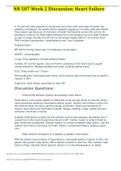
-
NR 507 Week 2 Discussion: Heart Failure (graded)
- Other • 3 pages • 2022
-
- $10.99
- + learn more
Case Scenario: A 72-year-old male presents to the primary care office with shortness of breath, leg swelling, and fatigue. He reports that he stopped engaging in his daily walk with friends three w eeks ago because of shortness of breath that became worse with activity. He decided to come to the office today because he is now propping up on at least 3 pillows at night to sleep. He tells the NP that he sometimes sleeps better in his recliner chair. PMH includes hypertension, hyperlipidemia and Ty...

How much did you already spend on Stuvia? Imagine there are plenty more of you out there paying for study notes, but this time YOU are the seller. Ka-ching! Discover all about earning on Stuvia


